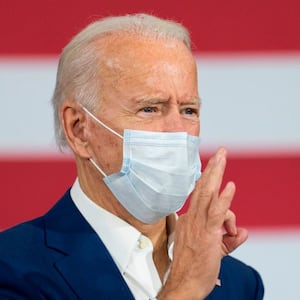When Joe Biden followed the lead of local Democratic officials and announced this week that federal employees and contractors would have to be vaccinated or else tested constantly and barred from traveling, the reaction from union leadership was swift and largely negative.
With the people who were most eager to be jabbed having already done so and the Delta variant spreading across America, vaccinations have turned from a mass event to an individual one. No longer are people grabbing midnight appointments at sports stadiums or posting selfies on social media. The rush has slowed to a trickle, to the point where Biden also encouraged states to pay people $100 for getting vaccinated.
But as the country grapples with the right way to encourage vaccination, while allowing people to maintain some semblance of personal choice, unions have been openly opposing any push to force their members to vaccinate. This is particularly true of public sector unions.
As we debate if vaccines are a must to attend theater or dine at restaurants, a large chunk of government employees, nearly half, belong to a union, most of which are not interested in accepting a mandate. While non-unionized workplaces can demand their employees be vaccinated, unions are pushing back on the idea that the same can be required of their members.
Unionized workers are treated like a special protected class, outside of societal demands the rest of us face. Teachers’ unions in particular have behaved throughout the pandemic as if the sacrifices required of the rest of us could not be required of them. While America’s workers largely went back to their posts, American Federation of Teachers President Randi Weingarten helped the Center for Disease Control craft a policy that would keep schools closed and her members at home. Students in urban areas with politicians most influenced by the unions were most likely to not attend in-person school for nearly all of 2020.
Now Weingarten has been on TV saying they would “try” to open all schools this fall but has not made vaccination of her members a requirement. “We believe strongly that everyone should get vaccinated unless they have a medical or religious exception, and that this should be a mandatory subject of negotiation for employers to keep their employees safe and build trust.”
Of course, believing “strongly” that vaccination should be a “mandatory subject of negotiation” is not the same thing as believing strongly that vaccination should be mandatory for your members.
For those of us who don’t believe in forcing anyone to get the vaccine, the position of these unions is especially galling. “Negotiate with us,” their presidents argue. The implication is that something will be owed to the union members in return for doing something every American is being urged to do.
The Federal Law Enforcement Officers Association President Larry Cosme was pretty open about that, telling The Washington Post: “Rather than try to force employees to get vaccinations, the government could offer financial or other incentives to employees who get vaccinated.”
The American Postal Workers Union has also balked at requiring vaccinations from their members. Their line, too, is pay first and maybe then jab. “Issues related to vaccinations and testing for COVID-19 in the workplace must be negotiated with the APWU. At this time the APWU opposes the mandating of COVID-19 vaccinations in relation to U.S. postal workers.”
Health-care worker unions have, surprisingly, been at the forefront of protests against requiring members to be vaccinated. After California Governor Gavin Newsom announced last week that California would require its workers to be vaccinated, Service Employees International Union, which, according to the Wall Street Journal “represents 43% of California approximately 238,000 state employees” including health-care workers, said he was “appalled” at the move.
And in New York last week, Mayor Bill de Blasio made a similar announcement about city employees. That same week, the largest health-care union in the country held a rally where members of 1199SEIU United Healthcare Workers East protested after New York-Presbyterian Health System, a private hospital group, said it would be mandating vaccines. The union argues that making vaccines a condition of employment is unacceptable.
These are arguments traditionally made on the conservative side of the aisle but the pushback from unions in places like New York bely the myth that those not getting vaxxed, and concerned their employer will force them, are all Trump-voting rubes. Reports the New York Times:
“The opposition from unions—based in part on a general reluctance to force members, many of whom are Black and Latino, to get the vaccine—is more rooted in the logistics of offering vaccines or weekly tests, and the discipline for those who do not comply.”
But the logistics of offering vaccines or conducting weekly tests is something most businesses across the country are grappling with right now. Why should unions be exempt from that discussion until their members are offered something for compliance?
If the unions believe forcing their members to get vaccinated is a violation of their individual rights, they should say so. But a power grab, and money grab, after so many have sacrificed so much is, at best, unseemly.
“We’re all in this together” shouldn’t mean special dispensations for those who pay union dues.


